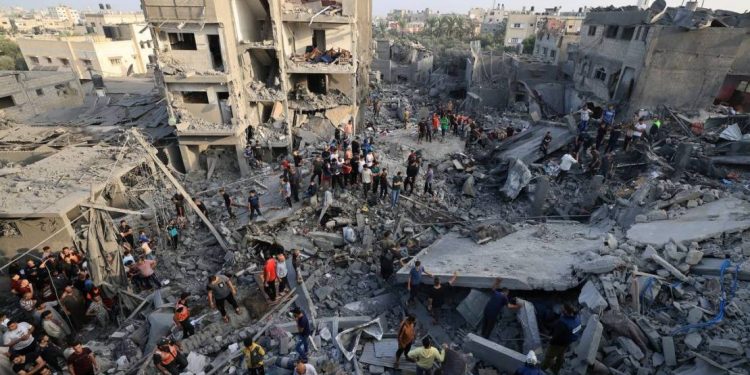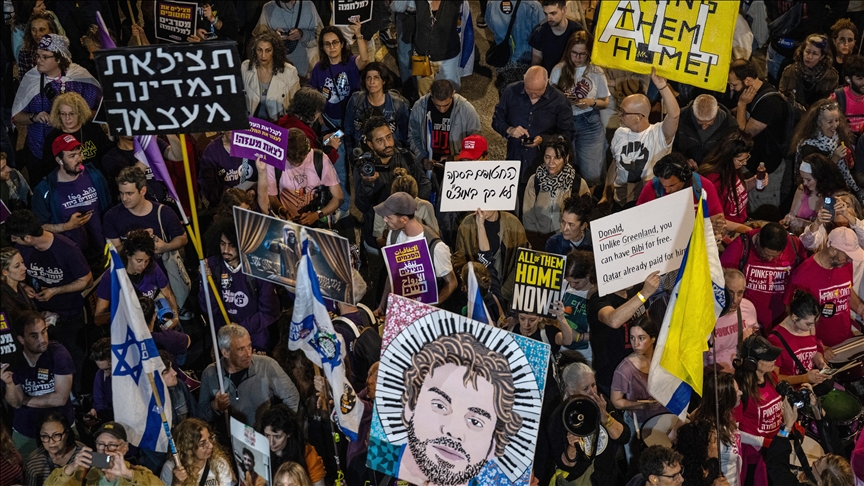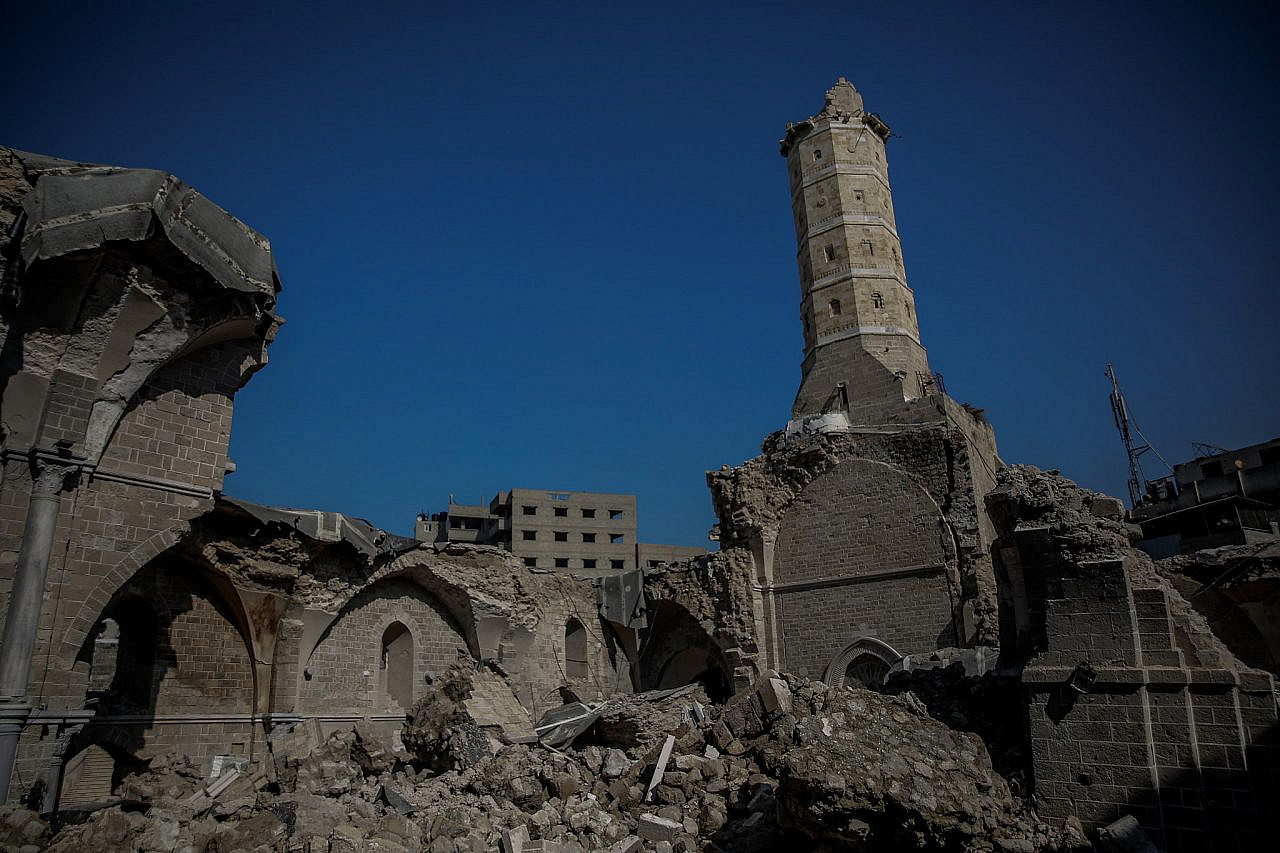
As part of Israel’s ongoing genocide against Palestinians in the Gaza Strip since October 2023, the Israeli army targeted the Juha family’s home without warning or military necessity. The attack resulted in a massacre that killed approximately 90 civilians – including 71 women and children – and injured dozens more.
According to a Euro-Med Monitor investigation, the Israeli military launched a massive assault against Palestinian civilians in the eastern parts of Gaza City shortly after the first truce ended in early December 2023. This assault included an attack on the Juha family building located in the densely populated Sha’af area, which, along with the Shuja’iyya neighbourhood, was a focus of the offensive.
In one of the most horrifying massacres carried out by Israel during its genocidal campaign against the Palestinians in the Strip, Israeli warplanes targeted the Juha family’s home in the Tuffah neighbourhood east of Gaza City on the morning of 6 December 2023. At least one bomb was dropped on the house – a compound consisting of two adjacent buildings. The unexpected attack completely destroyed the building, killing all of its occupants.
Investigations revealed that 117 people were living in the building at the time of the attack, with women, children, and the elderly comprising the majority. This count included both the primary occupants and several relatives who had been forcibly relocated from the Zeitoun neighbourhood.
I couldn’t feel anything and found myself buried under the rubble, surrounded by a raging fire. The ceiling was collapsing on us, and they were only able to dig a small hole to reach us
Liali Juha, a survivor of the massacre who was pulled from under the rubble
Most occupants died as a result of the bombing, while others were injured—some were dragged out from under the debris, and others were thrown outside by the force of the explosion. At least 17 people suffered burns, wounds, and fractures, with some experiencing limb amputations.
The explosion ripped apart the bodies of many victims, leaving their remains lying across the street and even on the roofs of buildings nearby. Over 34 bodies remain buried beneath the debris, while the bodies of approximately 56 people were recovered from beneath it.
During rescue efforts, residents faced significant challenges, particularly because communication with ambulances or civil defence teams was nearly impossible due to disruptions in internet and communications services. With no official response, the Juha family and local residents took it upon themselves to rescue victims using only manpower and basic tools.
The Euro-Med Monitor team conducted multiple field surveys of the main site. The investigations involved gathering testimonies from witnesses and survivors, documenting the extent of the destruction and the types of weapons used, and analyzing the attack in relation to other incidents in the area.
For accurate information, the team interviewed local residents who were eyewitnesses and nine survivors of the massacre. The Euro-Med Monitor team reviewed satellite images and aerial photos that documented the state of the building and the surrounding area before and after the attack, as well as photographs and video clips provided by eyewitnesses. The team found no evidence of military presence, such as military installations or armed elements, inside or near the Juha family home before or during the attack.
Since the publication of the investigation, Israel has not issued any public statements about the targeting or provided proof that there were any military targets within the building when it was bombed.
The report concludes that the principles of distinction, proportionality, and the duty to take necessary precautions – standards that Israel is legally required to uphold – were seriously violated. The timing of the attack, the types of munitions used, and the widespread indiscriminate destruction are deemed unjustifiable.
Euro-Med Monitor asserts that the targeting of the Juha family represents a grave violation of international humanitarian law, constituting multiple war crimes against civilians and civilian property. These actions are described not only as fully-fledged crimes against humanity but also as part of a large-scale, organised military assault on the civilian population of the Gaza Strip that began in October 2023.
The report further highlights that, in addition to the systematic and large-scale destruction of homes and shelters, the targeting of the Juha family home is emblematic of a broader pattern. This pattern includes the partial or complete destruction of 436,000 homes (roughly 92% of the homes in the Gaza Strip) and the killing of over 54,000 Palestinians, most of whom were inside their homes – indicating a deliberate strategy to target Palestinian civilians and infrastructure.
These events show a pattern of systematic and recurrent military attacks that are based on a plan that cannot be justified by any military necessity. This pattern indicates that there is a deliberate strategy to attack Palestinian civilians directly and collectively, while simultaneously destroying large numbers of homes and shelters, as two complementary strategies to accomplish a single goal: the elimination of the Palestinian population in the Strip.
Liali Raid Zaki Juha, 14, a survivor of the massacre who was pulled from under the rubble, recounted to the Euro-Med Monitor team: “I was talking with my uncle’s family when, suddenly, I couldn’t feel anything and found myself buried under the rubble, surrounded by a raging fire.”
“The fire was so intense that my uncle’s family melted before me, and there was no one to rescue us. My uncle’s family kept screaming for help—‘Get us out, Dad, get us out!’—with my uncle replying that he couldn’t,” she said. “The ceiling was collapsing on us, and they were only able to dig a small hole to reach us. They began smashing through with a heavy hammer to pull us from under the rubble, and after a lot of struggle, they managed to do it.”
“My mother, Manal Talat Muhammad Juha, 40, lost her leg,” Juha added, “I lost my brother, the family members of my uncle Iyad Zaki Atta Juha and the family members of my grandfather Zaki Atta Saleh Juha, 67, as well as my grandmother, Hadaya Nuzhat Saleh Juha, 51.”
Based on its findings, the Euro-Med Human Rights Monitor urged the relevant international parties to pressure Israel to allow international and UN investigation and inquiry committees into the Gaza Strip, in compliance with international law and the rulings of the International Court of Justice. The report calls for prompt, independent, and unbiased investigations into the targeting of civilians in the Juha family massacre and all other crimes committed by Israel against Palestinian civilians in the Gaza Strip.
The investigation also urged the International Criminal Court to examine all of Israel’s crimes in the Gaza Strip, including the murder of the Juha family. It also called for the extension of criminal responsibility to all perpetrators, the issuance of arrest warrants, and trials in compliance with international law and the Rome Statute.
In accordance with Article 6 of the Rome Statute, the report called on the International Court to recognise the events in the Gaza Strip as a crime of genocide and to treat Israel’s actions with the seriousness they warrant.
The report further demands that all nations cooperate with the International Criminal Court’s investigations by providing specialised factual and legal memoranda on the crimes committed by Israel, refraining from interfering with its work, and assisting in executing arrest warrants against Israeli officials, including Prime Minister Benjamin Netanyahu and former Defence Minister Yoav Galant.
Finally, the report calls for political and economic sanctions against Israel, an immediate halt to all arms sales, exports, and military and intelligence assistance, and the termination of all licences and agreements related to the import and export of weapons – including dual-use materials and technology – that could be used against the Palestinian people.







